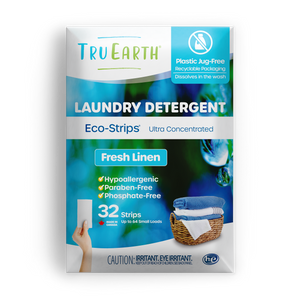In today's environmentally conscious world, sustainable practices are becoming increasingly important in all aspects of our lives, including our cleaning routines. One common question that arises is whether underwear should be washed in hot water.
In this article, we will explore the sustainability implications of washing underwear in hot water and discuss alternative approaches that align with eco-friendly values.

The Hot Water Debate: Washing Underwear
Washing underwear in hot water has been a common practice for many years. The belief is that hot water ensures better hygiene and effectively kills bacteria and germs that may be present. However, it's essential to examine the potential drawbacks of this approach from a sustainability perspective.
Energy Consumption and Environmental Impact
Heating water for laundry purposes requires a significant amount of energy, most commonly derived from non-renewable sources. This energy consumption contributes to greenhouse gas emissions, further exacerbating climate change.
Additionally, hot water usage puts a strain on water resources, as it requires a larger volume compared to cold water washing. Hot water wash cycles typically use around 90% more energy than cold water wash cycles.
The increased energy demand not only leads to higher utility bills but also contributes to the overall carbon footprint associated with our laundry practices. By using hot water solely for underwear washing, we are adding unnecessary environmental burden.
Sustainable Alternatives: Washing Underwear
Sustainability has become a critical concern for individuals and organizations alike. When it comes to personal hygiene practices like washing, it is essential to consider environmentally-friendly options that align with our responsibility towards the planet.
We will explore various sustainable alternatives for washing underwear that ensure hygiene and reduce our carbon footprint.
Cold-Water Washing Benefits
Washing underwear in cold water can be just as effective in terms of cleanliness and hygiene, while also minimizing energy consumption.
Many modern washing machines are designed to provide excellent results in cold-water cycles, effectively removing dirt, stains, and odors. Cold-water washing offers multiple benefits. Firstly, it eliminates the need for energy-intensive water heating, significantly reducing energy consumption.
Secondly, cold water washing helps preserve the quality of the fabrics, preventing shrinkage and color fading that can occur with hot water washes. Moreover, cold-water wash cycles are gentler on the garments, prolonging their lifespan and reducing the need for frequent replacement.
Eco-Friendly Detergents for Underwear Washing
Tru Earth's eco-friendly laundry detergent is the perfect solution for your underwear-washing needs. Our smart hypoallergenic formula is expertly designed to target and dislodge dirt and stains, effortlessly lifting them away and leaving your clothes looking and feeling refreshed.
Not only is our detergent highly effective, but it's also kinder to our planet. By reducing the use of single-use plastics, we're doing our part to help reduce the waste that ends up in our oceans and landfills.

With Tru Earth, you can feel confident that you're choosing a product that works well and is better for the environment. Say goodbye to harsh chemicals and single-use plastics, and hello to a cleaner, greener future with Tru Earth's eco-friendly laundry detergent.
Sustainable Laundry Practices for Underwear
In addition to adopting cold-water washing and using eco-friendly detergents, there are other sustainable laundry practices that can be applied specifically to washing underwear.
Efficient Sorting and Washing
Properly sorting laundry is essential to ensure efficient washing. Separate underwear from other garments to prevent damage and ensure appropriate washing cycles and temperatures. This helps maintain the quality of your underwear and improves energy efficiency.
Sorting your laundry allows you to optimize each load's size, ensuring you effectively utilize the machine's capacity. By washing similar fabrics and colors together, you can minimize the risk of color bleeding and reduce the need for additional washing cycles. This approach saves both energy and water, contributing to a more sustainable laundry routine.
Full Loads and Energy Conservation
Waiting until you have a full load of laundry before running the washing machine maximizes energy efficiency. This approach reduces the number of cycles required, ultimately lowering your carbon footprint and energy consumption.
Running multiple small loads throughout the week wastes energy and puts unnecessary strain on your washing machine. By being mindful of your laundry habits and planning ahead, you can optimize your energy usage and save resources in the process.
Air Drying or Low-Heat Drying
Whenever possible, opt for air drying your underwear. Hanging them on a clothesline or using a drying rack saves energy and eliminates the need for electricity consumption. If using a dryer is necessary, choose the lowest heat setting to minimize energy usage.
Air drying is a sustainable alternative to machine drying as it relies on natural airflow and sunlight to dry your garments. Not only does it reduce energy consumption, but it also helps preserve the fabrics' quality, preventing shrinkage and extending their lifespan. By embracing air drying or utilizing low-heat settings, you contribute to a more sustainable laundry routine.
Rethinking Underwear Washing Habits
It's important to reevaluate our traditional habits and consider how small changes in our laundry routines can make a significant impact on sustainability. By adjusting our practices and embracing eco-friendly alternatives, we contribute to a greener lifestyle while still maintaining the cleanliness and hygiene of our underwear.

Sustainability and Underwear Washing
In conclusion, the sustainability perspective suggests that washing underwear in hot water may not be the most environmentally friendly option.
Instead, adopting cold-water washing, using eco-friendly detergents, and practicing sustainable laundry habits can help reduce energy consumption, conserve water resources, and minimize our carbon footprint.
By making conscious choices, we can contribute to a more sustainable future while still ensuring the cleanliness and longevity of our underwear


